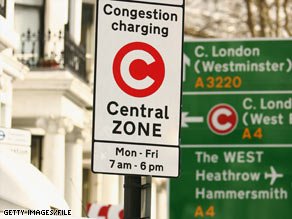The United Iraqi Alliance is also insisting that Iraq have a bigger role in determining whether U.S. soldiers accused of wrongdoing are subjected to prosecution in Iraqi courts.
If the conditions are not met, "I cannot see that this agreement will see the light," said Sami al-Askeri, a Shiite parliamentarian and political adviser to Prime Minister Nouri al-Maliki.
It was not immediately clear if the U.S. would accept the conditions, which would make significant changes to the draft agreement produced in recent days. The bilateral accord is aimed at replacing a United Nations mandate that provides the legal authority for U.S. troops to be in Iraq. It expires on Dec. 31.
The Bush administration has resisted setting firm dates for the
departure of U.S. troops from Iraq, saying it should be based on
security conditions. U.S. authorities ultimately accepted a compromise
in the agreement, which set a withdrawal date of the end of 2011 but
provided for an extension by mutual agreement.
Askeri said the possibility of an extension raised concerns among members of the Shiite bloc, who met on Saturday night.
"Some people say, what's going on?" he said. "This article opens the door to the next government" of Iraq to lengthen the U.S. troops' stay, he said. Iraq holds national elections next year.
On the issue of legal jurisdiction, the draft accord says that U.S. forces can be subject to Iraqi law if they are accused of a major crime while outside their bases and off-duty. American troops rarely leave their bases when not on official missions, so it would appear that soldiers would rarely, if ever, be subject to Iraqi law.
Askeri said that lawmakers did not want U.S. military authorities to make the decision on when a soldier was considered off-duty. That determination should be made by a joint committee, and if they deadlocked, it should go to an Iraqi court, he said. The Pentagon insists on having sole legal jurisdiction over U.S. troops in most foreign countries.
The draft status of forces agreement was being discussed Sunday night by the Iraqi Political Council for National Security, an advisory body of senior executive, legislative and judicial officials. If the council gives it the green light, the accord is to be sent to the Cabinet and the Parliament for approval.
The concerns voiced by Shiite lawmakers are the first major hurdle in what many U.S. and Iraqi officials anticipate will be a contentious and drawn-out process.
"We continue to be in discussion with the Iraqis and the Iraqis continue to discuss this amongst themselves," said Susan Ziadeh, the spokesperson at the U.S. Embassy in Baghdad. "That's to be expected. We'll see where these discussions lead."
Lawmakers aligned with Shiite cleric Moqtada al Sadr are the most vocal critics of an agreement that would extend the presence of U.S. troops in Iraq. They control 30 seats in the 275-seat Parliament, while the Shiite alliance has 85. Sadr leaders convened a large demonstration in Baghdad on Saturday during which thousands marched to express their opposition to the accord.
Kurdish lawmakers, who make up the second biggest block in parliament, support a deal. Leaders of Sunni blocs have not publicly expressed a strong opinion for or against the proposed agreement, saying they need time to examine the draft.
Discussions about contentious bills have stalled in Iraq's
parliament for months amid bickering and deadlocks. Many lawmakers are
likely to be particularly sensitive to the potential political
ramifications of their stance on the agreement because it is expected
to come up for a vote weeks before provincial elections.
'World News' 카테고리의 다른 글
| 2 Koreas to hold military talks Monday (0) | 2008.10.26 |
|---|---|
| Four Saintly Islands in the Caribbean (How Heavenly) (0) | 2008.10.26 |
| Official: Sarkozy's bank account hacked by thieves (0) | 2008.10.20 |
| Former Beijing Official Receives Death Sentence With Reprieve (0) | 2008.10.20 |
| China to help Pakistan build two more nuclear power plants (0) | 2008.10.19 |










